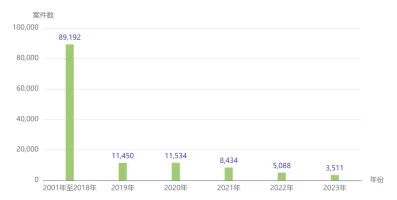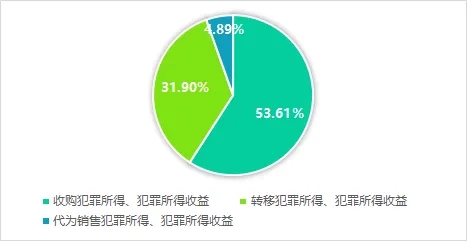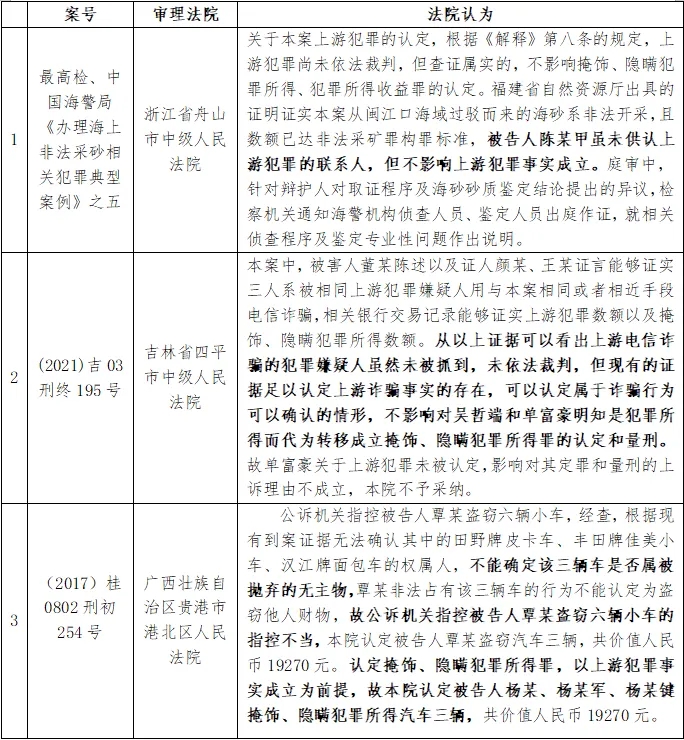Performance
The crime of concealing and concealing the proceeds of crime (originally suspected of money laundering), which was initially investigated by a local supervisory committee, was not prosecuted after the client had been detained for nearly twenty months, and the decision of "unclear facts and insufficient evidence" was finally made.
Achievements
After more than a year's effort, the case of G Moumou, represented by Wang Xinlong and Wang Qi, finally received the final judgment of the second trial, and the client regained his freedom and returned to his family shortly after the judgment came into effect. The original public prosecution for G moumou sentencing recommendation for three years and six months, after two sessions of the first trial, the public prosecution against the second trial hearing, the second trial court finally adopted some of the views of the defense, the party was sentenced to two years and three months imprisonment, than the original recommendation of the sentence is reduced by one year and three months of imprisonment.
I. Foreword
The crime of disguising, concealing the proceeds of crime and proceeds of crime is a relatively common crime in judicial practice. In practice, the case characterization controversy is also more concentrated, one is the relevance of the behavior involved in the predicate crime, and the second is whether the perpetrator has the subjective intent of this crime. In this paper, we will combine the defense experience of the aforementioned cases, briefly describe the practical overview of the crime of disguise, concealment of proceeds of crime, proceeds of crime and defense.
Second, the crime of practice overview
Article 312 of the Criminal Law of the People's Republic of China stipulates: "Anyone who harbors, transfers, acquires, sells on behalf of, or disguises or conceals in any other way the proceeds of crime and the proceeds arising therefrom when he or she knows that such proceeds are the proceeds of crime or the proceeds arising therefrom shall be sentenced to fixed-term imprisonment of not more than three years, criminal detention or control, and shall be punished by fines in addition to or separately from the fine; if the circumstances are serious, he or she shall be sentenced to fixed-term imprisonment of not less than three years but not exceeding seven years, and shall be fined. If a unit commits the crime in the preceding paragraph, the unit shall be sentenced to a fine, and its directly responsible supervisors and other directly responsible persons shall be punished in accordance with the provisions of the preceding paragraph."
In 2006, Amendment (VI) to the Criminal Law amended the object of the crime of harboring, transferring, acquiring or selling stolen goods from "stolen goods derived from crime" to "proceeds of crime and the proceeds thereof", which broadened the scope of the object of this crime by adding The provision of "disguising or concealing by other means" was added as an underlining provision, and the penalty provision of "aggravating circumstances" was also added to increase the strength of the penalty.
In 2009, the Amendment (VII) to the Criminal Law added a second paragraph on unit crimes.2021 The Supreme People's Court amended the Interpretation on Several Issues Concerning the Application of Law in the Trial of Criminal Cases of Concealment, Concealment of Proceeds and Gains from Crime (hereinafter referred to as the "Interpretation"), which requires that the people's court, in the trial of such cases, should take into account the nature of the predicate crime, the circumstances, consequences and social consequences of the concealment, concealment of proceeds of crime and its gains. and its proceeds, the circumstances, consequences and degree of social harm, etc., and convict and punish according to the law.
This crime is relatively common in judicial practice, with the number of such cases exceeding 10,000 per year from 2014 to 2020, based on the results of the "WK First" Judgment Database, and although the number of cases is on a downward trend from 2021 to 2023, it is still the most common of the crimes of obstruction of justice. .

Figure 1 Changes in the number of cases related to the crime of disguising or concealing the proceeds of crime and the proceeds of crime
Among the means of committing this crime, the means of "acquiring proceeds of crime and proceeds of crime" accounted for more than half of the cases, which is more common than the means of "transferring proceeds of crime and proceeds of crime" and "selling proceeds of crime and proceeds of crime on behalf of others". It was more common than "transfer of proceeds of crime" and "sale of proceeds of crime". [1]

Figure 2 Specific ways of disguising or concealing the proceeds of crime and gains from crime
Points for defense
(i) Whether the predicate offense is substantiated or not
Article 8 of the Interpretation stipulates the relationship between the crime of disguising, concealing the proceeds of crime and proceeds of crime and the predicate offense. The specific content is as follows: "The determination of the crime of disguising, concealing the proceeds of crime and proceeds of crime shall be based on the premise that the facts of the predicate crime have been established. If the upstream crime has not yet been adjudicated in accordance with the law, but is found to be true, it shall not affect the determination of the crime of concealing or concealing the proceeds of crime or the proceeds of crime. Where the facts of the upstream crime have been found to be true, but the perpetrator is not held criminally liable in accordance with the law for reasons such as the perpetrator not having reached the age of criminal responsibility, this shall not affect the determination of the crime of disguising or concealing the proceeds of crime or the proceeds of crime."
It contains two levels of content: first, the facts of the upstream crime must be established, which requires both that the facts of the upstream crime be proved by sufficient evidence and that the facts of the upstream crime reach the level of a crime. If the predicate act does not constitute a crime according to law although it exists, the act of concealment or concealment does not constitute a crime either. Secondly, the determination of the concealment or concealment of proceeds of crime or proceeds of crime shall, in principle, be carried out after the determination of the predicate offence in accordance with the law. Therefore, whether the predicate crime is proved by sufficient evidence or whether it constitutes a crime will directly affect whether the crime is established.
1. Examining the evidence of the predicate crime corresponding to the transaction in question
The establishment of the facts of the upstream crime is a prerequisite for the establishment of this crime. If the upstream crime has not been verified, the proceeds of the crime and its proceeds do not exist at all, and this crime can not be established due to the objective lack of prerequisites. Therefore, in practice, it is crucial to carefully examine whether the evidence of the predicate crime corresponding to each amount of money involved is complete.
(2021) Xiang 0682 criminal 180 judgment, the court recognized the defense for part of the amount of money involved in the lack of evidence put forward by the opinion: "the first instance public prosecutor accused of part of the amount of money involved, although the people involved in the case from the bank card to the defendant after taking out the money, but in the case of the evidence in the case, but there is no relevant telecommunication fraud cases of the victim's report material, the corresponding transfer records and The public security authorities issued a decision on the filing of the case and other evidentiary materials, it is difficult to prove that there are victims to the account to transfer money remittances, and therefore can not prove that the money in the account is the proceeds of crime of the predicate crime this view." And then found that: "the prosecution did not provide the corresponding evidence to confirm the defendant Huang Muhong to help transfer the funds are the proceeds of crime has been verified", and ultimately ruled that the defendant Huang Muhong guilty of disguise, concealment of the proceeds of crime evidence is insufficient to make a judgment of acquittal.
2. Concerned about the determination of predicate crimes that have not yet been adjudicated
Although the disguise, concealment of proceeds of crime, proceeds of crime, in principle, should be determined in the predicate crime according to law, but the "interpretation" is also clear that although not convicted, the investigation of the truth can also be determined. In practice, we should be concerned that the evidence of the upstream case may change, so that the treatment of the upstream crime will have variables, and even lead to the possibility of not establishing the crime. If the case involving this crime is not dealt with and examined simultaneously with the upstream case, it will produce very unfavorable consequences for the perpetrator, and may even lead to wrongful or unjustified cases. Therefore, in the event that the crime is found to have been committed prior to the predicate crime, the progress of the predicate crime case and its determination should be closely monitored, and if the predicate case is not ultimately found to have been a crime, a timely application should be made to initiate trial supervision procedures to correct the case involving the crime.
In practice, the court basically strictly grasps the prerequisite that "the predicate crime is substantiated". The author has compiled the court's viewpoints and attitudes in some cases for reference:

(ii) Subjective knowledge
The subjective "knowledge" of the perpetrator for the establishment of the premise of this crime, where the "knowledge" is generally interpreted as knowing or should know, "know" the content of the object of its behavior is proceeds of crime The content of "knowing" is that the object of the act is the proceeds of crime or the proceeds of crime.
Judicial practice often adopts a presumptive approach to the subjective determination, combining the time, place, quantity, price, variety, relationship between the perpetrator and the offender, the degree of understanding, and the conditions of the exchange to determine whether the perpetrator subjectively knew or not, for example:
(1) The perpetrator receives high remuneration from the perpetrator of the upstream offense or is presumed to be "aware" of it.
In the case of cover-up, concealment of proceeds of crime, proceeds of crime, Wu Zheduan, Siping Intermediate People's Court of Jilin Province held that: "In this case, the existence of multiple transfers of money, transfer of money over a long period of time, the remuneration is abnormally high, and significantly higher than the market fee, etc., it can be assumed that Shan FuHao on the transfer of money of the unlawful nature of the knowingly." Combined with witness testimony, the state of the perpetrator's bank liquidity, etc., the court found that the perpetrator knew that the object of the act was the proceeds of crime. [2]
(2) The existence of obvious anomalies in the transaction or the presumption of the perpetrator's "knowledge"
In the case of Shao Zhengchao and Lin Yangchao, the defendant Shao Zhengchao claimed that he "did not know" that the transferred property was proceeds of crime, but the court, based on the statements of other witnesses, the fact that the defendant's bank card had been frozen several times, and combining the cognitive ability of the defendant Shao Zhengchao with the way in which the proceeds were converted and transferred, found that the defendant Shao Zhengchao was aware that the proceeds of crime were the proceeds of crime. found that Defendant Shao Zhengchao knew that it was proceeds of crime and its proceeds. [3]
In the subjective knowledge of the determination and defense, need to synthesize the whole case evidence, analysis of adverse factors, supporting evidence to prove that the perpetrator has reason to believe that it is only a normal transaction and does not have subjective knowledge, combined with the behavior of the time and place of whether the anomaly, whether the stolen goods have a special sign, the perpetrator of the degree of knowledge of the predecessor crime, the use of the stolen goods, whether it is thus obtaining the illegal benefits of other factors, a comprehensive judgment whether to constitutes a crime.
(III) Focusing on Specific Offense Causes - Taking Investment and Financial Management as an Example
Although the crime of disguising and concealing the proceeds of crime has certain subjective attributes of seeking benefits in most cases, the object violated by the crime is to obstruct the criminal prosecution of the predicate crime by the judicial authorities, therefore, the subjective intent of the crime must have the direct intention of helping the predicate offender to disguise and conceal the proceeds of crime and the gains from the proceeds of crime. If the behavior of the perpetrator is out of a long-standing behavioral habit, and the money is highly mixed, or for personal use and unconsciously purchased the proceeds of crime, or only out of habit for investment and financial management, and there is no "disguise, concealment" of the purpose or intention, then it may not constitute a crime.
Taking investment and financial management as an example, there is controversy in practice as to whether investment and financial management by a perpetrator with proceeds of crime constitutes a crime.
It is argued that the act of investing with proceeds of crime can bring the perpetrator corresponding "legitimate" income or appreciation of assets, and that securities need to be registered by the competent national authorities, clearly reflecting the nature of transforming illegal proceeds into legitimate assets, and objectively causing additional difficulties for the judiciary, so that the use of proceeds of crime for investment should be recognized as a criminal offense. The proceeds of crime should be used for investment and financial management should be recognized as "disguise, concealment" behavior. [4] For example, in the case of Zhang Jing's disguise and concealment of proceeds of crime, Zhang Jing and Cheng Mou, who was suspected of opening a casino, were lovers, and Zhang Jing knew that Cheng Mou's economic source was the agent of offshore gambling platforms, and during the period of cohabitation, Cheng Mou transferred a total of RMB 3,970,000 yuan to Zhang Jing's Alipay, WeChat, and bank cards. Zhang Jing used more than 3 million yuan of this amount to invest in financial products. The court held that Zhang Jing's method of disguising and concealing the proceeds of crime by receiving, using, or possessing them was consistent with the constituent elements of this offense. [5] There are also views that need to focus on the subjective purpose of the perpetrator of the proceeds of crime for investment and financial management, if only out of habit, and no "cover up, concealment" of the purpose of the funds did not cause losses, clearly traceable without obstruction of justice, should not constitute this crime. [6]
In the case of the author on behalf of the existence of this problem, the defense that the person concerned to buy financial management is out of long-term investment and financial habits, and there is no positive cover up and concealment of behavior or psychology. After carefully examining all the account flow, the defense found that the party has a long time to buy the "fixed income" financial products, and the financial products is the lowest risk of financial products issued by the bank. The use of funds of this financial product is "100% invested in cash, bank deposits, bond repurchase, central bank bills, interbank depository receipts, bonds, asset-backed securities", which can not be used to buy stocks, and the risk is very low, and has never suffered any loss. And then that the person concerned to buy the financial products is out of perennial financial habits, belong to the negative, static storage of money behavior, subjectively does not have the purpose of positively concealing the nature of the money. Objectively did not cause losses, the funds are still in the same bank account, clearly traceable, did not play the effect of concealment of concealment. After repeated communication and exchange of views with the case authorities, in the unremitting efforts of the defense, the final party also obtained the best case results of absolute non-prosecution, regaining freedom.
Four, conclusion
The crime of disguising, concealing the proceeds of crime and proceeds of crime as a crime of obstruction of justice has received widespread attention. The above defense views for such cases have a certain universality, but each case has its own special features, need to be combined with specific cases to carefully comb the flow of funds, comprehensive analysis of the evidence in the case, only a comprehensive, detailed and accurate grasp of the defense strategy, in order to fight for the parties to the best case results.
Notes:
[1] Mengyao Wu, "Empirical Study on the Crime of Masking, Concealing Proceeds of Crime and Proceeds of Crime - Based on 247 Judgment Documents in Shaanxi Province," Master's Thesis, Northwestern University, 2022. Among the 247 adjudication documents in Shaanxi Province from 2018 to 2021, the highest number is the implementation of the act of acquiring the proceeds of crime and the proceeds of crime, with a total of 185 cases, accounting for 53.16%; the second is the implementation of the act of transferring the proceeds of crime and the proceeds of crime, with a total of 111 cases, accounting for 31.90%; and the last one is the implementation of the act of selling the proceeds of crime and the proceeds of crime on behalf of the person, with 17 cases, accounting for 4.89%."
[2] See Shan Fuhao and Wu Zheduan, Case of Masking and Concealing Proceeds of Crime and Proceeds of Crime, Criminal Judgment No. (2021) Ji 03 Criminal Final 195 of the Intermediate People's Court of Siping City, Jilin Province.
[3] See Shao Zhengchao and Lin Yangchao, Case of Masking and Concealing Proceeds of Crime and Proceeds of Crime, Criminal Judgment of the Second Instance of Liaoning Province Fuxin Intermediate People's Court (2022) Liao 09 Criminal Final No. 20.
[4] See He Ronggong, Observations, Explorations and Reflections on the Judicial Application of the Crime of Money Laundering, in Law Review, No. 3, 2023.
[5] See Zhang Jing, Masking and Concealing the Proceeds of Crime, Criminal Judgment No. 408 of the Criminal Court of Jiangshan City, Zhejiang Province (2021) 浙0881刑初408号刑事判决书。
[6] See Zhang Mingkai, Criminal Law, Law Press, 2021, p. 1101.




